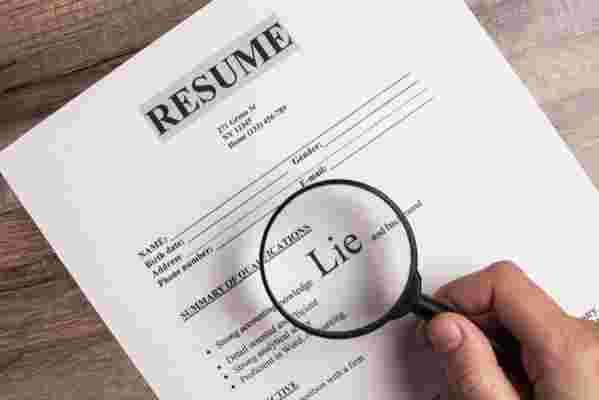Lying on your resume is one of those things that most of us have done at some point. And we get it, sometimes it feels like the only way to lock down the job of your dreams. Or… just a job in general.

But, a quick Google on the matter quickly reveals that lying is bad news for job hunters — as it can cost them an opportunity or come back to haunt them down the road.
Exaggerating on your resume might not be illegal, but it’s not part of your recipe for success.
Here’s why you shouldn’t fudge your credentials—at least not too much.
What happens when you lie on your resume?
Why lying is a bad idea
Okay, the main reason you shouldn’t lie on your resume doesn’t have to do with morals.
Rather, it’s likely to catch up to you at one point or another. Many employers go through great lengths to check out their candidates during the initial screening process.
For one, online background checks can reveal a lot about a person — from criminal records to college degrees, work experience, and salary. And, of course, hiring managers are expecting an exact match to come back.

Best questions to ask before leaving your next job interview
Will multiple meetings happen before you get hired? Is an algorithm involved at any stage?
We ask these questions together, as even if you “check out” on paper, a body language analysis might come into play.
For example, interviewers might ask a series of behavioral questions—which are detailed questions along the line of, “Can you think of a time when you did XYZ to boost revenue?”
These questions require a certain depth, and if you’re not prepared for the line of questioning, an interviewer might think you’re not honest.
Algorithms — which are increasingly coming up in the screening process — will scan for eye movements, fidgeting, and other indications that an interviewer isn’t being completely honest.
Finally, some recruiters opt to secretly collect references by secretly contacting people who worked with you in the past.
The idea is to get around the possibility that you’ve asked your friend to pose as your former boss or coached a colleague to talk up your positive attributes and none of your weaknesses.
In any case, there are plenty of opportunities to get caught before the hiring process kicks into high gear.

LinkedIn report shows most coveted worker skills
What counts as a lie?
A lie isn’t necessarily an all-out falsehood. Omissions, too, can be just as dishonest.
Things like altered employment dates, as well as embellished reasons for leaving your previous position, are technically lies, as they prevent the employer from understanding your role and performance.
Again, there’s nothing morally wrong with lying about why you want a job or couldn’t stay in your old one. However, if you’re lying about how you feel, you risk landing in a position that doesn’t work for you.
And then there’s the tangible stuff. Employers can verify where you went to school or issue a skills assessment to see if you really know all those languages.
Obviously, if your social media accounts reference your work history, or there’s a Google-able trail of your experience, hiring managers can easily spot a faker.
On top of that, it’s very easy for hiring managers to contact your past employer, to do some fact checking or run a formal background check before making an offer.
That said, even if your references check out and your social media is pristine, your body language can betray you.
Interviewers can pick up on specific cues like looking at the ground or touching your face that indicates you’re not telling the truth.
How to prepare for a FaceTime job interview
Big lies spell big trouble
The bigger the lie, the higher the chance that your attempt to level up will come back to haunt you.
Lies like swapping out your state school credentials for something more Ivy League or saying you have a master’s degree when you’re a few credits shy of a bachelor’s tend to be among the worst lies according to a survey by the resume company Hloom.
Another study found that the majority of hiring managers revealed that if they found out that a candidate was lying, they’d remove them from consideration.
The thing is, even if you make it through the hiring rounds, the story isn’t over. You might be forced to lie more to coworkers or employers to keep up the facade.
There have been several instances of high profile executives who were publicly fired after resume lies came to light.
And, that kind of big deal lie makes it onto your permanent record. Take, for example, the Walmart exec forced to resign, 20 years after lying about graduating from college. Or the Notre Dame football coach whose lies caught up to him just five days into the job.
In some cases, lying might not only tarnish your reputation but land you in jail. Earlier this year, New York made it illegal for nannies to lie about their credentials.
These are the highest-paying online careers
What about the small stuff, then?
According to a CareerBuilder survey, 75% of employer respondents have caught a lie on a resume.
The survey found that the most common lies on a resume included relatively small offenses — inflated responsibilities, embellished skillsets, employment dates, job titles, and academic degrees earned.
Everyone wants to sell the best version of themselves.
Saying you’ve taught yourself how to code or edit videos is fine, just don’t lie about earning a degree or certificate when you haven’t.
And, we should mention if you are a few skills shy of meeting the requirements, apply anyway and make the case for why you deserve to be there.
More about careers
Guide to finding jobs with LinkedIn ►
How to future-proof your career ►
How to use social media to find your next job ►
How to write the best resume in Google Docs ►

